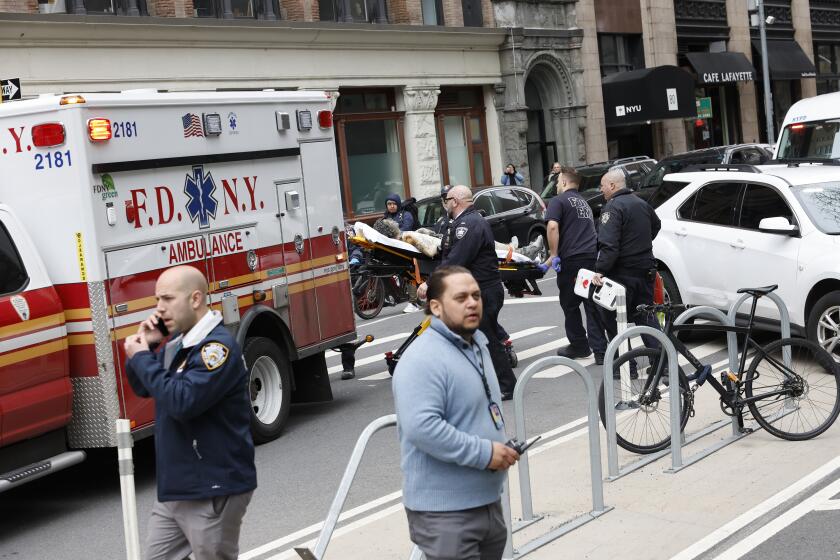Pro-Mubarak protester started out on the other side
Mohamed Sami Fahmi started out on the other side of the barricades.
When protesters first went into the streets last week to demand changes from Egypt’s entrenched, authoritarian leaders, the clean-cut 26-year-old travel guide was with them.
But frustrated as he was by high-level corruption, he was more inclined to view President Hosni Mubarak as a fellow victim of officials he had appointed.
So when the 82-year-old Mubarak told the nation Tuesday that he would step down this fall at the end of his term, Fahmi thought that was enough. Mubarak, after all, is a father figure, a war hero, the only Egyptian leader Fahmi has ever known.
“Since he became Egypt’s president, he has done a lot to develop the country and maintain peace and stability,” Fahmi said Thursday as he sheltered under a downtown Cairo overpass with stones flying 100 yards away.
“Any Egyptian seeking reforms and positive change should have been convinced. Protesters should have gone home and given the president and his Cabinet a chance to fulfill their promises.”
Instead, the protests picked up steam. And the longer they went on, the more damage they would cause to an economy that was already limping.
Now that everything is closed and tourism unlikely to recover for months, the Cairo University graduate thinks he’ll be spending his savings to feed himself, his parents and two sisters instead of saving to get married and buy an apartment.
“People are out of work and out of money, and we reached a situation where Egyptians are fighting against and killing each other,” he said.
So on Wednesday, he headed to a pro-Mubarak demonstration in the upper-middle-class neighborhood of Mohandeseen, on the other side of the Nile River from Tahrir Square, where the main anti-government protests were being staged.
That’s when group dynamics kicked in and things really spun out of control.
“Around 2 p.m., some people started joining the demonstration and screaming, telling us that other pro-Mubarak protesters in Tahrir Square were being slaughtered and killed by the anti-Mubarak demonstrators,” he recalled. “Many of us ran toward Tahrir to see what was going on, and of course we were enraged by what we heard.
“We didn’t find anyone slaughtered, but we decided to join the pro-Mubarak demonstration there, since we were there anyway,” he said. At first, the two sides were far enough apart to prevent trouble.
Fahmi accused the other side of starting to throw stones and firebombs, which he said caused the now-infamous horse and camel charge caught on video and broadcast worldwide.
“This situation frightened the camel and horse riders, who were peacefully demonstrating with us,” he said. “They decided to run away, and so anti-Mubarak people thought the camel riders were attacking them and from there everything went crazy and the nonstop violence erupted.”
Fahmi said he ended up fighting for his safety and that of his friends.
“Whoever was caught by the anti-Mubarak people was severely beaten and tortured on the other side. Molotov cocktails and stones were just flying at us, and at one point the two sides were very close,” he said.
He felt that his side was winning until evening, when their numbers diminished and their opponents started advancing. The fighting lasted until well into early Thursday.
“We hung on for a few hours, as many of us were severely injured.... We were no more than a few hundred and we could hear them shout, ‘God is great!’ and bang with sticks on pieces of fencing as if they were in a battlefield against the country’s enemies.”
“I was really scared for my life. Then around 4 a.m., some of them crossed their shields and fencing and approached us. We were really helpless and most of us ran in different directions. I heard live gunshots while I was running at full speed for at least 10 minutes. It was a horrible scene.”
No so horrible, however, that Fahmi wasn’t back on the front line of the battle for Egypt’s future a few hours later.
On the other side of the barricades, he claimed, people “have hidden agendas and are being paid and sponsored by foreign infiltrators,” including Israel.
“Those who have taken over Tahrir Square are not real Egyptians,” he said.
Hassan is a news assistant in The Times’ Cairo Bureau.
More to Read
Start your day right
Sign up for Essential California for news, features and recommendations from the L.A. Times and beyond in your inbox six days a week.
You may occasionally receive promotional content from the Los Angeles Times.







